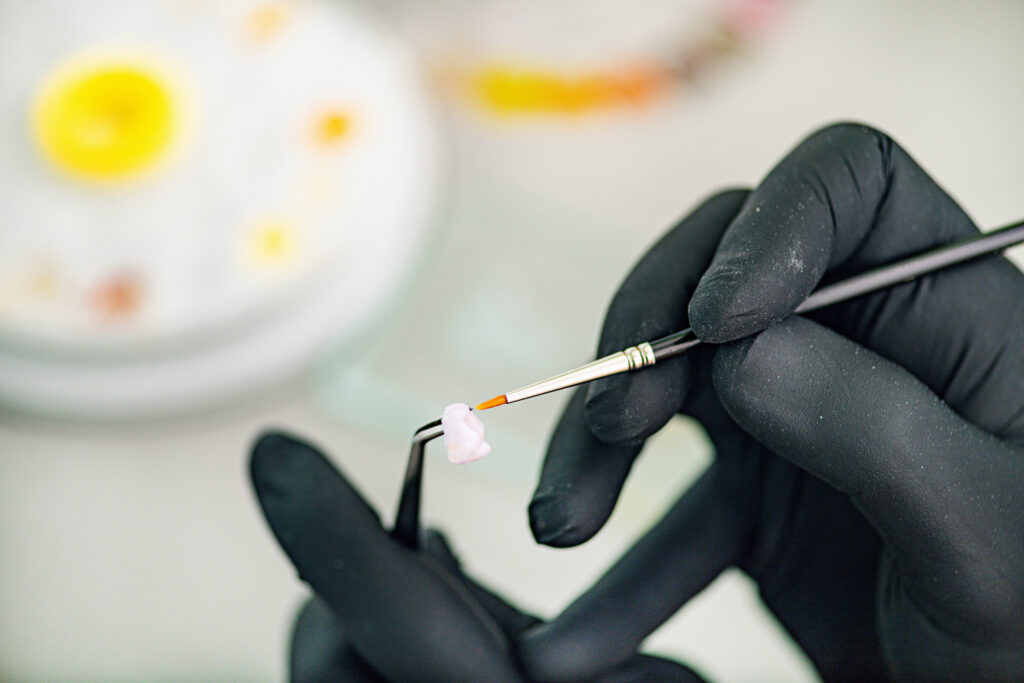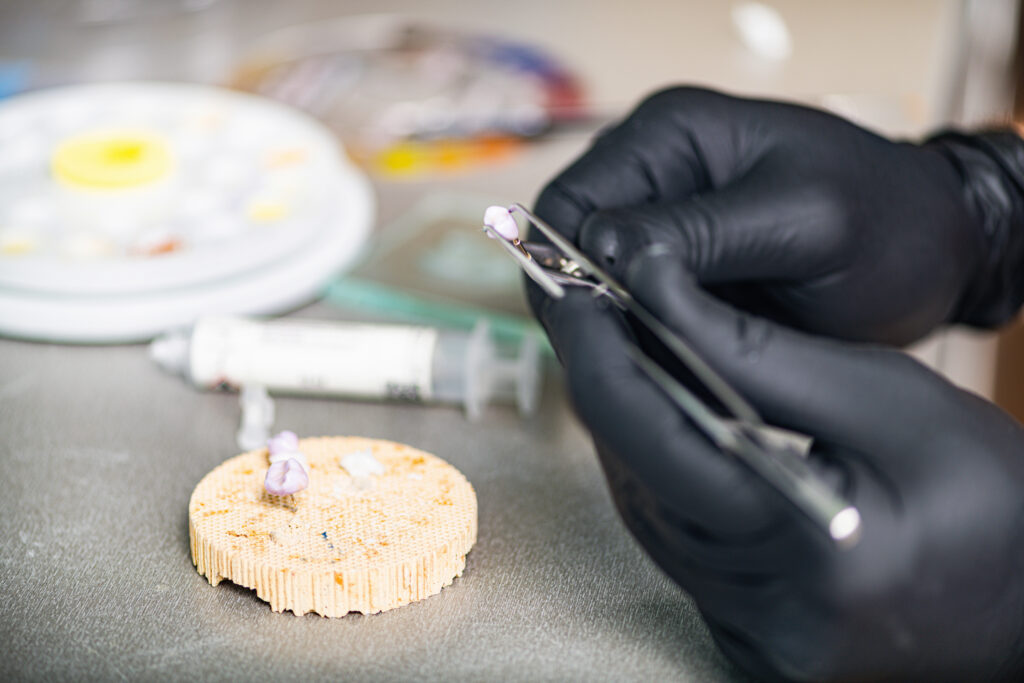What are dental crowns?
Dental crowns, also known as dental caps or tooth crowns (dental restoration), are common dental restorations used to protect, strengthen, and enhance the appearance of a damaged or weakened tooth.
These crowns, including dental bridges, are custom-made to fit over a patient’s natural tooth, providing a durable and aesthetically pleasing solution to a variety of dental issues.
Here is some more general information about dental crowns:
Purpose of Dental Crowns
- Protection: Crowns are used to protect a tooth that has been significantly damaged by decay, injury, or dental procedures like root canals.
- Strength: They restore a tooth’s strength and structural integrity, preventing further damage.
- Aesthetics: Crowns can improve the appearance of a tooth by concealing discoloration, misshapenness, or other cosmetic imperfections like a broken tooth.
- Functionality: They enable the proper functioning of a tooth, allowing for effective biting and chewing by being a large filling for missing teeth.
Types of Dental Crowns
Dental crowns come in various types, each with its own set of advantages and considerations. The choice of crown type depends on factors like the location of the tooth, aesthetic concerns, and budget. Gold crowns for example are an “old” type of crowns, which is not used anymore by modern dental clinic in Turkey like the Cosmedica Dental.
Here’s more information about some of the modern types of dental crowns:
1. Ceramic Crowns
2. Porcelain fused to Metal Crowns (PFM) / Porcelain crowns
3. Metal Crowns
4. All-Resin Crowns
5. Zirconia Crowns
Crown Placement Process
- Diagnosis: The dentist assesses the tooth’s condition and determines if a crown is necessary.
- Tooth Preparation: The tooth is reshaped to accommodate the crown.
- Impression: An impression is taken to create a custom crown that fits perfectly.
- Temporary Crown: A temporary crown is placed while the custom one is fabricated.
- Permanent Crown Placement: Once the custom crown is ready, it is cemented onto the prepared tooth.
Lifespan of Dental Crowns

How long do crowns last? The longevity of dental crowns can vary depending on several factors. On average, a well-maintained dental crown can last anywhere from 10 to 15 years. Some crowns may even endure for 25 years or more, while others may need replacement sooner.
Factors affecting the longevity of dental crowns
The following factors can influence how long your dental crown will last:
- Material Used: The material of the crown plays a significant role in its durability. Ceramic crowns are more susceptible to chipping, while metal crowns are exceptionally durable.
- Oral Hygiene: Maintaining excellent oral hygiene is vital to prolong the life of your crown. Regular brushing, flossing, and dental check-ups are essential.
- Teeth Grinding: Habitual teeth grinding or clenching can put extra stress on your crown, leading to premature wear and tear.
- Diet: A diet high in sugary and acidic foods can deteriorate the dental cement holding the crown in place.
- Accidents and Trauma: Accidents can lead to crown damage. Wearing a mouthguard during activities that may result in head or face injuries is advisable.
Caring for Your Dental Crowns
To ensure your dental crowns last as long as possible:
- Brush and floss regularly to prevent gum disease and decay.
- Avoid chewing hard objects or ice, which can damage the crown.
- Use a mouthguard if you grind your teeth at night.
- Attend regular dental check-ups for professional assessment.
Signs of a Worn-Out Crown
Over time, your dental crown may show signs of wear. It’s essential to recognize these signs promptly.
- Visible Damage: Cracks, chips, or fractures in the crown material.
- Tooth Sensitivity: Increased sensitivity to hot or cold substances.
- Loosening: The crown may feel loose or fall off.
When to Replace Dental Crowns
Dental crowns may need replacement if they show signs of wear, such as visible damage, tooth sensitivity, or loosening. Regular dental check-ups help dentists monitor the condition of crowns and recommend replacement when necessary.
The Crown Replacement Process

If your dental crown shows signs of wear or damage, it’s essential to replace it. The dental crown process typically involves the following steps:
- Removal: The old crown is carefully removed.
- Tooth Preparation: The tooth is reshaped to accommodate the new crown.
- Impression: An impression is taken to create a custom crown.
- Temporary Crown: A temporary crown is placed while the custom one is being fabricated.
- Permanent Crown Placement: The new crown is cemented into place.
Cost of Crown Replacement
Prolonging the Life of Your Crowns
To extend the life of your dental crowns, consider the following tips:
- Dental Check-Ups: Regular dental visits to your dentist are crucial for maintaining your oral health and the longevity of your crowns.
- Oral Hygiene: Continue practicing good oral hygiene with regular brushing, flossing, and rinsing.
- Avoid Bad Habits: Don’t chew ice, hard candy, or other hard objects, and try to reduce teeth grinding.
- Diet Modification: Dentists may recommend to limit your intake of sugary and acidic foods, as they can weaken the cement holding the crown.
- Mouthguards: If you grind your teeth, consider using a mouthguard to prevent damage to your crown.
Conclusion – How long do crowns last?
Dental crowns are valuable dental restorations that can last for many years with proper care. Regular dental check-ups and maintaining excellent oral hygiene are crucial for ensuring the longevity of your dental crowns.
When signs of wear or damage appear, promptly consult your dentist for a replacement.